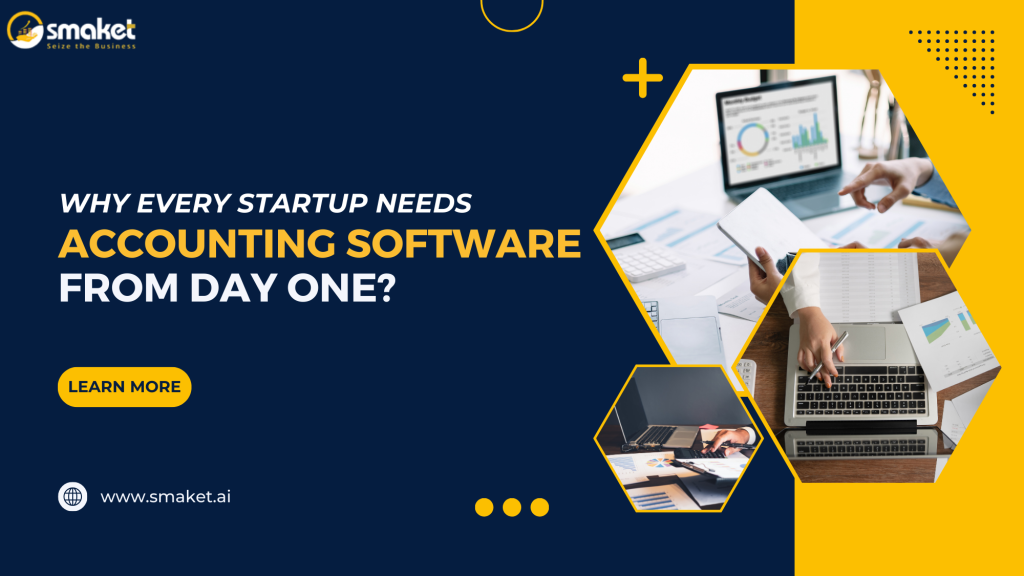Starting a new business is an exciting venture, but it also comes with its share of challenges. One of the most critical yet often overlooked aspects of running a successful startup is managing finances effectively. Establishing a solid accounting system from the very beginning can save time, reduce stress, and help ensure the long-term success of your business. In this blog post, we will explore why every Startup needs accounting software from day one, focusing on its ability to help new business owners stay organized, track expenses, and manage cash flow.
1. Stay Organized and Save Time
For startup owners, time is a precious resource. Between product development, marketing, and customer acquisition, it’s easy to overlook the importance of keeping financial records organized. Accounting software simplifies this task by automating processes such as expense tracking, invoicing, and reporting. Instead of manually entering data into spreadsheets, the software helps streamline your workflow and reduces the risk of human error.
2. Track Expenses and Monitor Cash Flow
In the early stages of a startup, cash flow is often tight, and keeping track of expenses is crucial. Accounting software provides you with a clear view of your cash flow and allows you to categorize and track every transaction. This real-time overview of your financial position helps you identify potential problem areas before they become bigger issues.
With accounting software, you can set budgets, track expenses against revenue, and monitor your cash flow to ensure that you always have enough liquidity to run operations smoothly. Tools like expense tracking and cash flow forecasting allow you to manage your money more effectively, giving you the insight needed to make informed decisions.
3. Ensure Tax Compliance
Taxes can be daunting for any business, especially for startups with limited experience in handling financial regulations. Accounting software helps ensure tax compliance by automatically tracking deductible expenses, providing accurate reports, and organizing financial data to prepare for tax season.
With the right software, you can easily generate financial reports, such as profit and loss statements and balance sheets, which are essential when filing taxes. Many accounting software programs also integrate with tax software, ensuring seamless tax filing and minimizing the risk of mistakes or audits.
4. Access to Financial Reports and Insights
Financial reports are essential for evaluating the health of your business. Accounting software generates real-time reports like income statements, balance sheets, and cash flow projections, offering you valuable insights into your financial performance. This data helps you understand whether your startup is on the right track or if adjustments are needed.
Having access to these reports at any time enables you to make informed decisions about budgeting, investment, and other financial matters. For example, if your profit margins are shrinking, you can use your financial data to identify areas where you can cut costs or improve efficiency.
5. Scalability for Growth
As your business grows, so will your financial management needs. The good news is that most accounting software is scalable and designed to grow with your startup. From handling multiple users to tracking complex financial transactions, modern accounting systems can adapt to your evolving needs.
Accounting software for startups offers a variety of customizable features, such as automated invoicing, inventory tracking, and payroll management, to ensure your business stays organized as it scales. Investing in a flexible accounting solution now will save you from the headache of switching systems later.
6. Improved Decision-Making
In the early stages of your startup, every decision is critical. Access to accurate, up-to-date financial data is essential for making informed choices. Whether you’re deciding whether to hire new employees, expand to a new market, or invest in marketing, accounting software provides you with the financial insights you need.
Real-time financial reports allow you to assess your current position and make strategic decisions based on actual data, not assumptions. With the right tools in place, you can plan for future growth and avoid costly mistakes that could derail your startup’s progress.
7. Professional Image and Investor Confidence
When pitching to investors or collaborating with business partners, presenting organized, professional financial statements can make a huge difference. Accounting software helps you maintain transparent and up-to-date financial records, which can boost your credibility and demonstrate that you are serious about your business’s success.
A solid accounting system shows that you are managing your finances responsibly and reduces the likelihood of mistakes that could jeopardize investor confidence. This is particularly crucial when you’re seeking funding or negotiating with potential stakeholders.
8. Security and Data Protection
In today’s digital age, protecting your business’s financial data is more important than ever. Most accounting software solutions offer robust security features, including encryption, two-factor authentication, and secure cloud storage, to safeguard sensitive information.
By using accounting software with built-in security measures, you can also rest assured that your financial data is protected from theft or unauthorized access. This gives you peace of mind as your startup grows and your financial transactions become more complex.
Conclusion:
The importance of having a reliable accounting system in place from day one cannot be overstated. Accounting Software helps you stay organized, manage cash flow, track expenses, and also make better financial decisions—critical elements for any startup’s success.
By investing in accounting software early, you set the stage for smooth operations, compliance with tax regulations, and the ability to scale your business with ease. Whether you’re just starting or looking to streamline your processes, accounting software is an essential tool for every entrepreneur.

